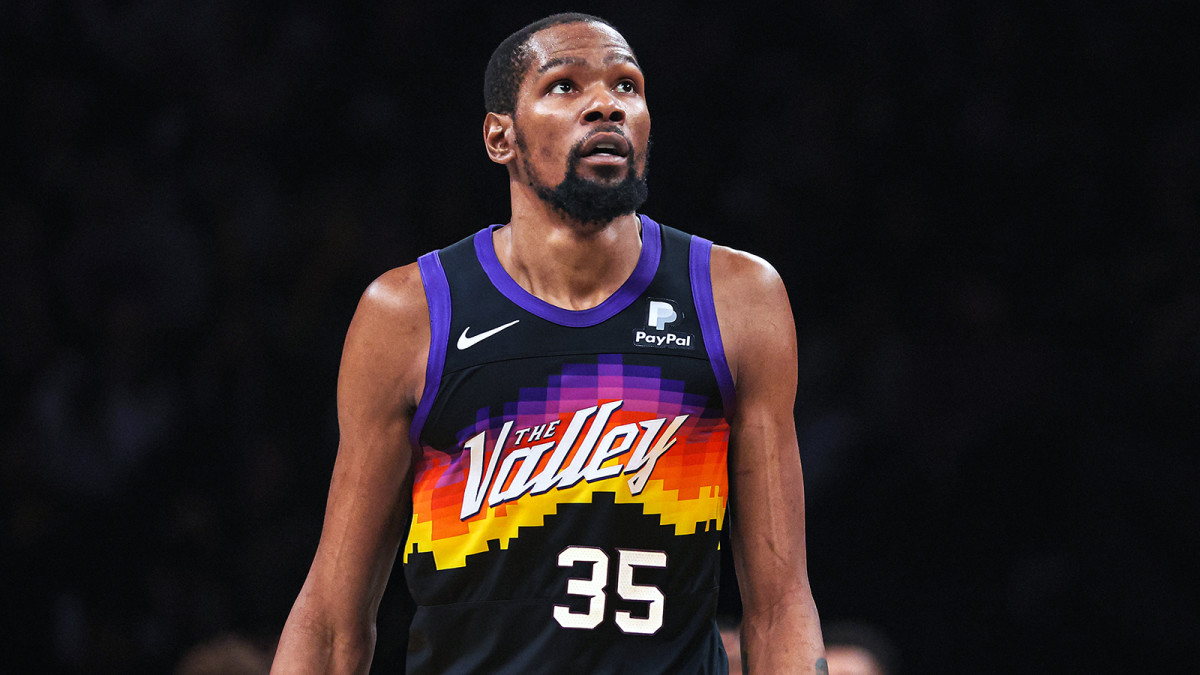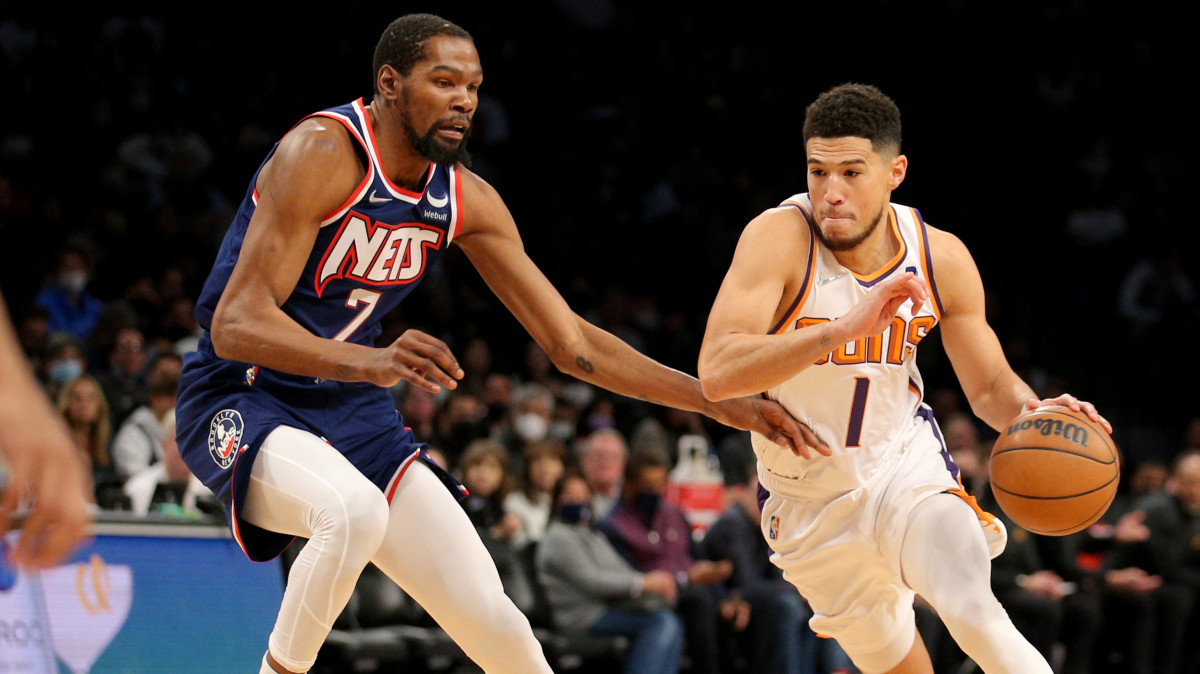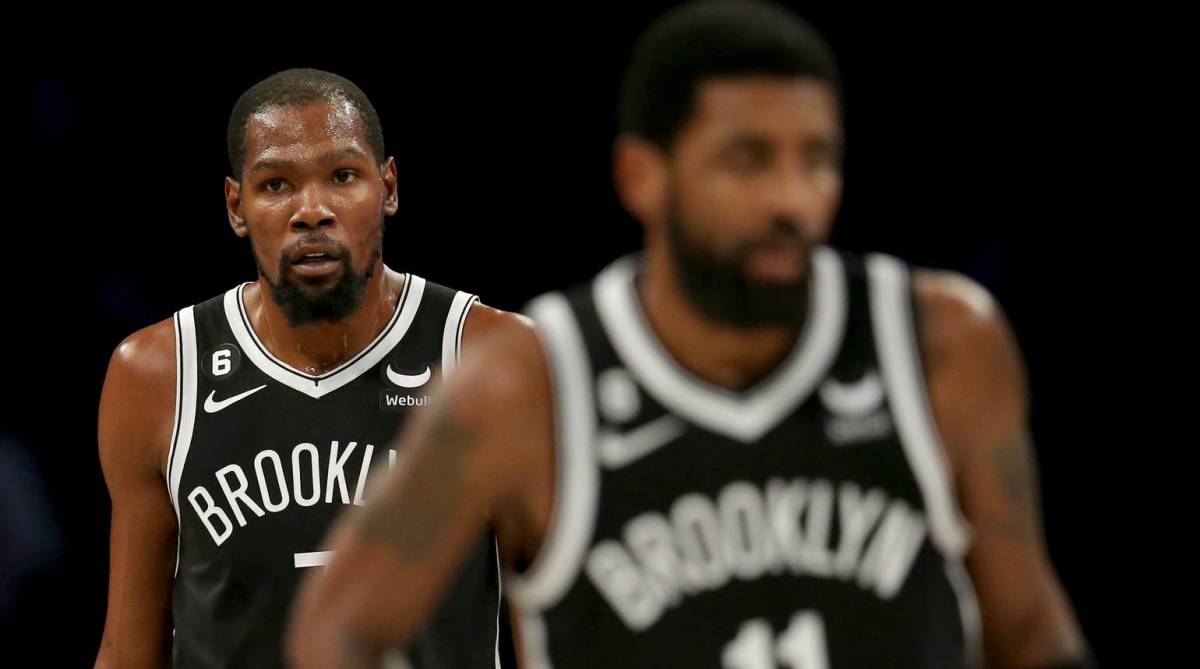Instant Takeaways After Suns Trade for Kevin Durant
After dealing Kyrie Irving on Sunday, the Nets traded Kevin Durant to the Suns for Mikal Bridges, Cam Johnson, Jae Crowder, four first-round picks and additional draft compensation. The Crossover staff breaks down the deal for Phoenix and the end of KD-Kyrie era in Brooklyn.
What’s your immediate reaction to the Kevin Durant trade?
Howard Beck: That it was inevitable, logical and clearly the smartest way forward for the Nets. Their title hopes effectively ended the moment they traded Kyrie Irving. And as I wrote in November, when I made the case for a Nets teardown: There’s no point in having a 34-year-old Durant if you can’t plausibly contend for titles.
I’m moderately surprised it happened this quickly and this soon; I thought they might see how far KD plus role players could go this spring, then reassess in the offseason. (I also thought the Kyrie trade, which brought back veteran players instead of a ton of draft picks, signaled an intent to keep building for the present around Durant.)
But it was smart to strike now, with the Suns eager (desperate?) to make a splash, and before Durant gets hurt again. The Nets got about as much talent and draft equity as you could hope for, given his age and recent injury history. His value can only go down from here.
Chris Herring: (1) Damn, this new Suns owner isn’t messing around. (2) That it makes the Suns really interesting—time will tell how much better it makes them—while giving KD a clean slate he desperately seemed to need after linking himself so heavily to Kyrie in Brooklyn. (3): Phoenix is just now getting healthy again, and it’ll certainly be the team to watch out West after the break.

Robin Lundberg: My immediate reaction was that Woj was clearly doing something when he started that Suns talk in his tweets a couple of days ago. Then it went to realizing that the Nets’ disastrous era was officially over with only one playoff series win to show for having Durant, Irving and James Harden all on the roster at one point. That entire saga only hurt the franchise and all the superstar players involved.
Chris Mannix: Surprise, really. When Brooklyn prioritized players over picks in the Irving-Dallas trade, the sense leaguewide was the Nets were going to try and see how far Durant and a roster deep with versatile role players could get them. In fact, if the Suns had not come so aggressively, I think that's exactly what would have happened. But Phoenix came to the table with Mikal Bridges (who Brooklyn, like everyone, loves) and four unprotected picks. That's a hard offer to turn down. Ultimately, Joe Tsai, the Nets’ owner, couldn't.
Jeremy Woo: I guess I’m surprised? But maybe I shouldn’t be. It’s a pretty courageous first move by the new Suns ownership to immediately mortgage your future. It’s a pretty good parachute for the Nets and was probably the only move they had left, so it was shrewd to get it done in-season (even if it was a one-team negotiation). And I think the haul is pretty good, all things considered, if the emphasis was going to be securing draft capital. There’s not really a great way to give up Kevin Durant, but shorting a situation where two of the best players are approaching the ends of their careers isn’t the worst way to do things. The 2027 and 2029 firsts and the 2028 pick swap are a long way away, though.
Are the Suns now the favorites to win the NBA title this year?

Mannix: Er, maybe let’s see them play first? Durant-Booker is a potent 1-2 scoring combination, and Paul is the right point guard to make it all work. But Phoenix just traded away its best defender, has no real depth and still rosters a once-disgruntled center who will likely have to adjust to getting fewer touches than ever before. When Durant is healthy and on the floor his teams win, so as long as someone else doesn't collapse into his knee again, the Suns should be good. How good depends on what James Jones can do to fill in the roster around him.
Herring: I don’t think I can readily declare that with a team that’s been banged up all year and is now adding an injury-prone player—albeit a superstar—who’s out at the moment. We also can’t ignore that Paul has taken a clear step back, logging his least efficient campaign from 2-point range since 2006–07, his second year in the league. Still, the Suns have more top-flight firepower now, and that’s meaningful for the postseason.
Lundberg: I think the best thing about this NBA season is there is no clear-cut favorite. The Suns sacrificed a lot of wing defense to make this trade, and that could be a big deal come playoff time. Durant got to a team with talent and is still a game-changing player, but in a weird way there may be more pressure on him to deliver in Phoenix. Ultimately, the Celtics remain the best team in the league from my point of view.
Woo: Phoenix will have the most-talented lineup in the league on paper, but its previous problems never totally seemed to be about that, and the vibes have been a little weird for some time. I think they still had to try something. I’m not totally ready to slap the “F” word on them, but try me in two weeks or something and I’ll probably get there.
Beck: Favorites? No. In the mix, absolutely. I’m really intrigued to see what a Durant-Booker-CP3–Deandre Ayton lineup can do. Durant and Booker just became one of the best 1-2 punches in the league. But the Suns just lost a lot of length, depth and defense in trading Bridges, Johnson and Crowder. Durant and Paul are both older and injury-prone, and Paul is showing signs of decline. Also, it’s really rare to acquire a superstar midseason and win a title. The Suns have just 26 games left to create some sort of chemistry. We don’t know when Durant will play again or how well that sprained knee will hold up once he returns. But the West is wide open, and the Suns now have as good a shot as anyone.
What’s the biggest takeaway from the KD-Kyrie era in Brooklyn?

Herring: To me? That KD’s greatness was thwarted by injuries and wasn’t enough to overcome all the disruptions Kyrie caused there. They linked their fortunes together because of their friendship, but it seemed like Durant just wanted to play without having distraction after distraction to contend with.
Beck: It was an unmitigated failure. There’s no other way to define it. They won one postseason series in three years, with more Kyrie controversies than playoff wins.
There was always a fair amount of risk baked in. Durant had to miss a full year after Achilles surgery, so Year 1 was always going to be a wash. The Nets knew Irving was a chaos agent who could either lead them to glory or torpedo them entirely and, well, we know which door Irving chose.
To be clear, the Nets did the right thing in signing both stars in 2019, because Durant is just that great and because you had to sign Irving to get Durant. It was easily the greatest offseason haul in team history and an important validation for the franchise. But the Nets made some catastrophic errors along the way, ceded way too much power to their stars and eventually had their hopes derailed.
Mannix: As bad as the Kobe-Nash-Howard Lakers were (you remember that Sports Illustrated cover) the Nets’ experiment was worse. The end result of three, in-their-prime, All-NBA, MVP-level stars on one roster was one—one!—playoff series win. Incredible. You want a takeaway? Brooklyn has tried twice in the last 10 years to assemble superteams. Maybe try something different.
Woo: Building a superteam is only sustainable with the right personalities and harmonious skill sets. This may have always been a better idea on paper (brief James Harden era in particular), and the Nets wound up in a situation where problems continuously compounded and where they had to leverage themselves out more and more. If nothing else, they’re now in a flexible position and get to start fresh. Moving Durant was the only way that could happen.
Lundberg: The KD-Kyrie era takeaway can be summed up in one word: drama. It never ended as it seemed there was always the false hope of a championship for that nucleus and always another shoe to drop. It will certainly go down as one of the biggest failures in NBA history.
